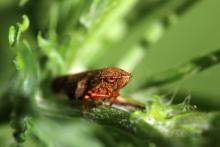Identify the presence of potential insect vectors of Xylella fastidiosa in Scotland

Xylella fastidiosa is a bacterial plant pathogen that can cause disease in a broad range of hosts, including Polygala myrtifolia, Olea europaea, Rosmarinus Officinalis, Lavandula sp., Prunus sp. and Nerium oleander. Disease symptoms include leaf scorch, wilting of foliage, dieback and plant death. Xylella fastidiosa was first detected in Europe in 2013 in Puglia in Italy and was identified as subspecies pauca which has gone on to devastate olive plantations in this region. There are currently major Xylella outbreaks in Southern France, including Corsica, Italy, mainland Spain and the Balearic Islands. The bacteria are transmitted by xylem feeding insects from the Cercopidae family, which include froghoppers and spittlebugs.
There are several species of insects that could vector Xylella fastidiosa in the UK including the meadow spittlebug (Philaenus spumarius), which is very common in Scotland. An outbreak of Xylella in Scotland would have serious impacts on the affected grower/nursery and any other host plant-related activities/business within a 5km buffer zone. Therefore, in order to establish the potential for these bacteria to spread, should they be introduced, it is important to identify and get an understanding of the abundance of potential Xylella vectors in Scotland. The WrEN project (http://www.wrenproject.com/), presents a unique opportunity to make use of existing insect collections to map the occurrence of potential Xylella vectors within agricultural woodlands across Scotland. Since 2013, partners on the WrEN project have surveyed over 130 secondary and ancient woodland sites for habitat and wildlife in two regions of mainland Britain. To date, over 1100 species have been recorded from a wide range of taxa. Vegetation structure has been characterised at all sites including information on tree species richness, tree density and size, understorey and canopy cover. In addition, the surrounding landscape has been mapped at a range of spatial scales up to 3 km from each site.
Impact: This project will contribute to Scottish Government’s preparedness measures for the possible
arrival of Xylella fastidiosa by identifying and mapping the distribution of potential vectors of Xylella
in Scotland.
There are several species of insects that could vector Xylella fastidiosa in the UK including the meadow spittlebug (Philaenus spumarius), which is very common in Scotland. An outbreak of Xylella in Scotland would have serious impacts on the affected grower/nursery and any other host plant-related activities/business within a 5km buffer zone. Therefore, in order to establish the potential for these bacteria to spread, should they be introduced, it is important to identify and get an understanding of the abundance of potential Xylella vectors in Scotland. The WrEN project (http://www.wrenproject.com/), presents a unique opportunity to make use of existing insect collections to map the occurrence of potential Xylella vectors within agricultural woodlands across Scotland. Since 2013, partners on the WrEN project have surveyed over 130 secondary and ancient woodland sites for habitat and wildlife in two regions of mainland Britain. To date, over 1100 species have been recorded from a wide range of taxa. Vegetation structure has been characterised at all sites including information on tree species richness, tree density and size, understorey and canopy cover. In addition, the surrounding landscape has been mapped at a range of spatial scales up to 3 km from each site.
Impact: This project will contribute to Scottish Government’s preparedness measures for the possible
arrival of Xylella fastidiosa by identifying and mapping the distribution of potential vectors of Xylella
in Scotland.
